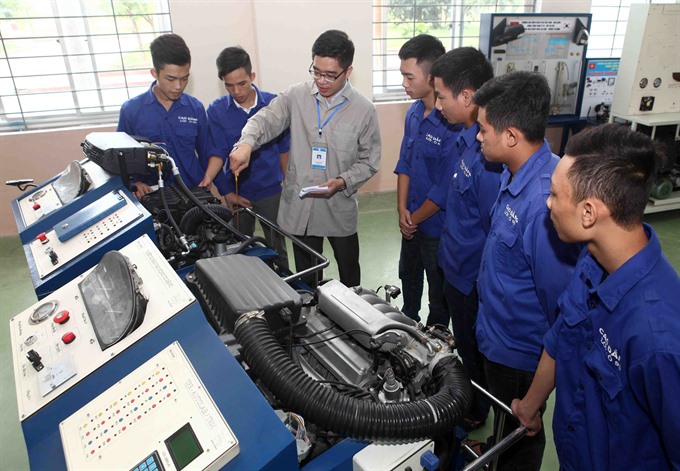 Society
Society

The Vietnam General Confederation of Labour (VGCL) has proposed amending the law on Vietnamese workers working abroad under contracts to give trade union organisations direct participation in protecting overseas labourers.
 |
| Students of Việt Nam – South Korea Vocational College of Industrial Technology are in training. — VNA/VNS Photo Thanh Tùng |
HÀ NỘI — The Vietnam General Confederation of Labour (VGCL) has proposed amending the law on Vietnamese workers working abroad under contracts to give trade union organisations direct participation in protecting overseas labourers.
The confederation made the proposal at a workshop held in Hà Nội on April 26 on trade unions’ role in supporting Vietnamese working overseas.
Speaking at the event, Mai Đức Chính, deputy head of the confederation, said that besides values created for their families and themselves, overseas workers contributed for the socio-economic developments of both sending and receiving countries.
In 2017, Việt Nam had nearly 140,000 workers abroad with existing labour contracts in which female workers accounted for 39.6 per cent, exceeding the target of 28.3 per cent. It is estimated there are more than US$2 billion in remittances sent to Việt Nam annually by overseas workers and interns.
The reality, however, is not all sunshine and rainbows. Chính said besides the gains, Vietnamese working abroad face many risks. Due to a lack of information, many had to pay high fees for intermediaries, or were deceived to work illegally. There are also cases of workers abused by employers.
Therefore, the intervention of VGCL, according to Chính, is important to ensure safety forVietnamese working overseas. VGCL suggested that the National Assembly would make amendments on the law of contract-based Vietnamese workers overseas in which the direct participation of VGCL in protecting Vietanese workers abroad would be added.
The agency recently has provided workers with consultations, conducted awareness-raising workshops and organised training courses to improve capacity of trade unions’ officers. The cooperation with trade unions in South Korea and Malaysia, popular countries among Vietnamese labourers, is upheld to protect their fundamental rights and benefits.
To support returned workers to reintegrate with the domestic labour market, VGCL asked the International Labour Organisation and the Asian Fund to help the confederation in conducting talks and signing memorandums of understanding on labour cooperation with other countries as well as providing financial as well as technical assistances.
Delegates from labour federations in Thanh Hóa and Phú Thọ provinces shared their views on the role of labour unions in helping workers before they leave for overseas jobs and after they return home. Many voiced the concern that many guest workers did not join labour unions, which is a major obstacle for the unions in protecting their rights and interests.
According to the Vietnamese Department of Overseas Labour (DoLAB) under the Ministry of Labour, Invalids and Social Affairs, in 2017, Taiwan was still the market receiving the largest number of overseas workers, almost 67,000. By November, 2017, there were about 200,000 Vietnamese workers working in Taiwan, accounting for 30 per cent of the economy’s overseas labour market.
Japan, at the same time, witnessed the remarkable increase in Vietnamese workers with more than 54,000 people, including 23,530 females. Việt Nam also sent the largest number of interns to Japan with 150,000 people in the past 20 years.
Besides traditional sectors including industry or services, some labour markets are seeking for workers in nursing and agriculture, creating more job opportunities for Vietnamese workers.
South Korea, Saudi Arabia, Malaysia and Algeria are among many other labour markets receiving a large number of Vietnamese working overseas in 2017.
The growth showed Governmental agencies’ efforts in organising dialogues with about 280 labour-export enterprises to solve remaining challenges and improving the quality of Vietnamese workers sent abroad. — VNS




